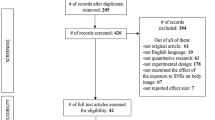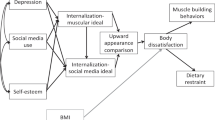Abstract
Background: Understanding the need for and accessibility to healthier foods have not improved the overall diets of the U.S. population. Social cognitive theory (SCT) may explain how other variables, such as self-regulation and self-efficacy, may be key to integrating healthier nutrition into U.S. lifestyles.Purpose: To determine how SCT accounts for the nutritional content of food purchases and consumption among adults in a health promotion study.Methods: Participants were 712 churchgoers (18% African American, 66% female, 79% overweight or obese) from 14 churches in southwestern Virginia participating in the baseline phase of a larger health promotion study. Data were collected on the nutrition related social support, self-efficacy, outcome expectations, and self-regulation components of SCT, as well as on the fat, fiber, fruit, and vegetable content of food-shopping receipts and food frequency questionnaires. These data were used to test the fit of models ordered as prescribed by SCT and subjected to structural equation analysis.Results: SCT provided a good fit to the data explaining 35%, 52%, and 59% of observed variance in percent calories from fat, fiber g/1000 kcals and fruit and vegetable servings/1000 kcals. Participants’ age, gender, socioeconomic status, social support, self-efficacy, negative outcome expectations, and self-regulation made important contributions to their nutrition behavior—a configuration of influences consistent with SCT.Conclusions: These results suggest a pivotal role for self-regulatory behavior in the healthier food choices of adults. Interventions effective at garnering family support, increasing nutrition related self-efficacy, and overcoming negative outcome expectations should be more successful at helping adults enact the self-regulatory behaviors essential to buying and eating healthier foods.
Similar content being viewed by others
References
Blendon RJ, DesRoches CM, Benson JM, et al.:Harvard School of Public Health OBESITY POLL, July 2005. Boston: Harvard School of Public Health. Retrieved May 31, 2007 from http://www.hsph.harvard.edu/press/releases/blendon/ObesityTopline.doc
U.S. Department of Agriculture Agricultural Research Service Food Surveys Research Group Beltsville Human Nutrition Research Center:Results from USDA’s 1994–96 Diet and Health Knowledge Survey: Table Set 19. October 2000. Beltsville, MD: Author. Retrieved May 31, 2007 from http://www.ars.usda.gov/SP2UserFiles/Place/12355000/pdf/dhks9496.PDF
Reed J, Frazão J, Itskowitz R:How Much Do Americans Pay for Fruits and Vegetables? Agriculture Information Bulletin, Number 790, July 2004. Washington, DC: Economic Research Service, USDA. Retrieved May 31, 2007 from http://www.ers.usda.gov/publications/aib790/
Buzby J, Farah H, Vocke G:Will 2005 Be the Year of Whole Grains? Washington, DC: Economic Research Service, USDA. Retrieved May 31, 2007 from http://www.ers.usda.gov/AmberWaves/June05/pdf/FullIssueJune2005.pdf
Nord M, Andrews M, Carlson S:Measuring Food Security in the United States: Household Food Security in the United States, 2004. United States Department of Agriculture Economic Research Service, Report No. Er111. Washington, DC. Retrieved May 31, 2007 from http://www.ers.usda.gov/publications/err11/
Reeves MJ, Rafferty AP: Healthy lifestyle characteristics among adults in the United States, 2000.Archives of Internal Medicine. 2005,165:854–857.
USDA, Economic Research Service:Food Guide Pyramid Servings Data. Washinton, DC: Author. Retrieved May 31, 2007 from http://www.ers.usda.gov/data/foodconsumption/FoodGuideIndex.htm#calories
Farah H, Buzby J:US Food Consumption up 16% Since 1970. Amber Waves. Washington DC: Economic Research Service, USDA. Retrieved May 31, 2007 from http://www.ers.usda.gov/AmberWaves/November05/pdf/FullIssueNovember2005.pdf
French SA, Harnack L, Jeffery RW: Fast food restaurant use among women in the Pound of Prevention study: Dietary, behavioral and demographic correlates.International Journal of Obesity and Related Metabolic Disorders. 2000,24:1353–1359.
Nestle M: The ironic politics of obesity [Editorial].Science. 2003,299:781.
Nielsen SJ, Popkin BM: Patterns and trends in food portion sizes, 1977–1998.Journal of the American Medical Society. 2003,289:450–453.
French SA, Story M, Jeffery RW: Environmental influences on eating and physical activity.Annual Review of Public Health. 2001,22:309–335.
Wadden TA, Brownell KD, Foster GD: Obesity: Responding to the global epidemic.Journal of Consulting and Clinical Psychology. 2002,70:510–525.
Peters JC, Wyatt HR, Donahoo WT, Hill JO: From instinct to intellect: The challenge of maintaining healthy weight in the modern world.Obesity Reviews. 2002,3:69–74.
Bandura A:Self-Efficacy: The Exercise of Control. New York: Freeman, 1997.
Hill JO, Peters JC: Environmental contributions to the obesity epidemic.Science. 1998,280:1371–1374.
Anderson ES, Winett RA, Wojcik JR: Social cognitive determinants of nutrition behavior among supermarket shoppers: A structural equation analysis.Health Psychology. 2000,19:479–486.
Anderson ES, Winett RA, Wojcik JR, Winett SG, Bowden T: A computerized social cognitive intervention for nutrition behavior: Direct and mediated effects of fat, fiber, fruits, and vegetables, self-efficacy and outcome expectations among adults.Annals of Behavioral Medicine. 2001,23:88–100.
Luszczynska A, Gibbons X, Piko BF: Self-regulatory cognitions, social comparison, and perceived peers’ behaviors as predictors of nutrition and physical activity: A comparison among adolescents in Hungary, Poland, Turkey, and USA.Psychology & Health. 2004,19:577–593.
Ford ES, Ahluwalia, IB, Galuska DA: Social relationships and cardiovascular disease risk factors: Findings from the Third National Health and Nutrition Examination Survey.Preventive Medicine. 2000,30:83–92.
Steptoe A, Perkins-Porras L, Rink E, Hilton S, Cappuccio FP: Psychological and social predictors of changes in fruit and vegetable consumption over 12 months following behavioral and nutrition education counseling.Health Psychology. 2004,23:574–581.
Maes S, Karoly P: Self-regulation assessment and intervention in physical health and illness: a review.Applied Psychology. 2005,54:267–299.
Pelletier LG, Dion SC, Slovinec-D’Angleo M, Reid R: Why do you regulate what you eat? Relationships between forms of regulation, eating behaviors, sustained dietary behavior change, and psychological adjustment.Motivation and Emotion. 2004,28:245–277.
Vartanian LR, Herman CP, Polivy, J: Does regulatory focus play a role in dietary restraint?Eating Behaviors. 2006,7:333–341.
Ammerman AS, Lindquist CH, Lohr KN, Hersey J: Efficacy of behavioral interventions to modify dietary fat and fruit and vegetable intake: A review of the evidence.Preventive Medicine. 2002,35:25–41.
Schnoll R, Zimmerman BJ: Self-regulation training enhances dietary self-efficacy and dietary fiber consumption.Journal of the American Dietetic Association. 2001,101:1006–1011.
Grossarth-Maticek R, Eysenck HJ: Self-regulation and mortality from cancer, coronary heart disease, and other causes: A prospective study.Personality and Individual Differences. 1995,19:781–795.
Bandura A: Health promotion by social cognitive means.Health Education and Behavior. 2004,2:143–164.
Weinstein ND: Misleading tests of health behavior theories.Annals of Behavioral Medicine. 2007,33:1–10.
Block 98 Food Frequency Questionnaire. Berkeley, CA: Block Dietary Data Systems, 1998.
Anderson ES, Winett RA, Bickley PG, et al.: Improving food purchases: The effectiveness of a public access, multimedia intervention in supermarket settings.Journal of Health Psychology. 1997,2:209–223.
Winett RA, Anderson ES, Bickley PG, et al.: Nutrition for a Lifetime System: A multimedia system for altering supermarket shoppers’ purchases to meet nutritional guidelines.Computers in Human Behavior. 1997,13:371–392.
Duncan OD, Hatt PK, North CC: A socioeconomic index for all occupations. In Reiss AJ, (ed),Occupations and Social Status. New York: Freeman, 1961, 109–138.
Jöreskog KG, Sorbom D:LISREL 8.8. Chicago: Scientific Software, 2007.
Jöreskog KG, Sorbom D: LISREL 7:A Guide to the Program and Applications (2nd ed.). Chicago: SPSS, Inc., 1989.
Kline RB:Principles and Practice of Structural Equation Modeling (2nd ed.). New York: Guilford, 2005.
Author information
Authors and Affiliations
Corresponding author
Additional information
The study conducted at the Center for Research in Health Behavior, Department of Psychology, Virginia Tech, Blacksburg, was supported by a grant from the National Cancer Institute (RO1CA79469). The trial is registered in the National Cancer Institute’s PDQ trial registry (VPISU-05-209).
About this article
Cite this article
Anderson, E.S., Winett, R.A. & Wojcik, J.R. Self-regulation, self-efficacy, outcome expectations, and social support: Social cognitive theory and nutrition behavior. ann. behav. med. 34, 304–312 (2007). https://doi.org/10.1007/BF02874555
Issue Date:
DOI: https://doi.org/10.1007/BF02874555




